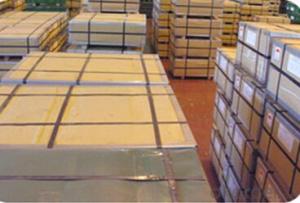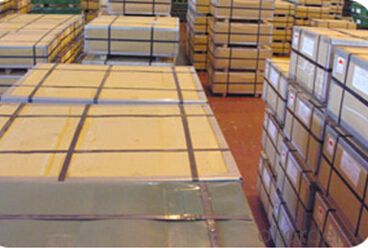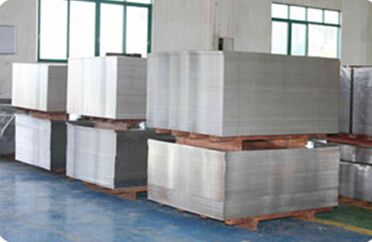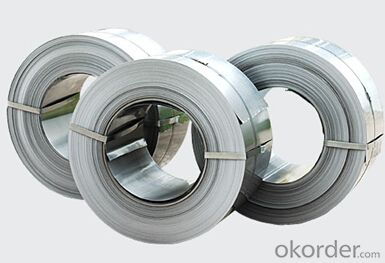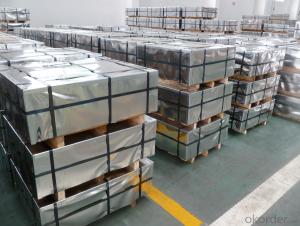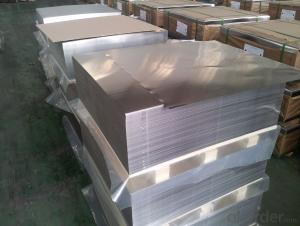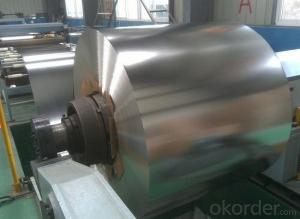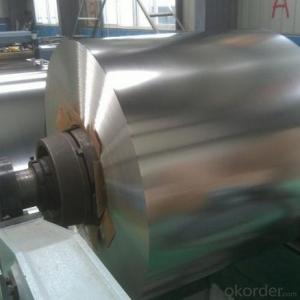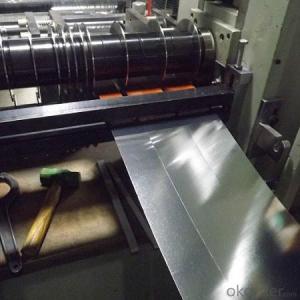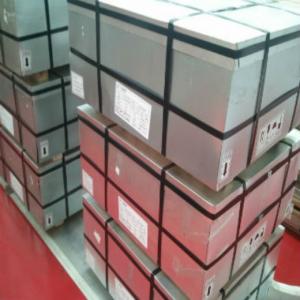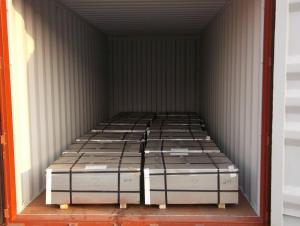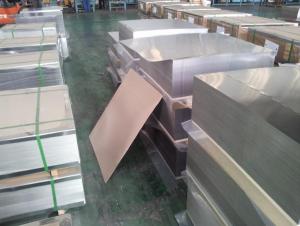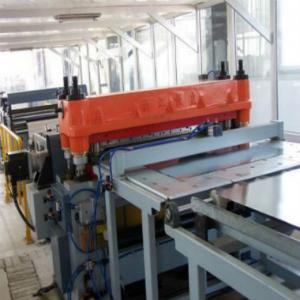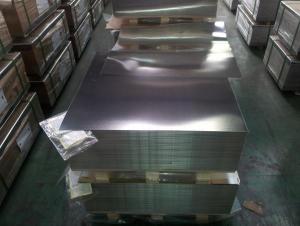Prime Quality Tinplate Sheet for Making Cans
- Loading Port:
- Shanghai
- Payment Terms:
- TT or LC
- Min Order Qty:
- 25 m.t.
- Supply Capability:
- 1000 m.t./month
OKorder Service Pledge
OKorder Financial Service
You Might Also Like
Specification
Prime Quality Tinplate Sheet for Making Cans
1.Structure of Description
Prime Quality Tinplate Sheet for Making Cansis one of the metal packing materials, which is widely used for making painting cans ,chemical package cans , electrical cable ,battery and metal printing etc.
2. Main Features
Steady and high quality
Fast shipment
Good experience for export work
For the surface, Plate uniform in thickness,uniform and smooth tin coating, without flaws,rusts,scratch,wave,nick of tin coating etc.
Price competitive
3. Images
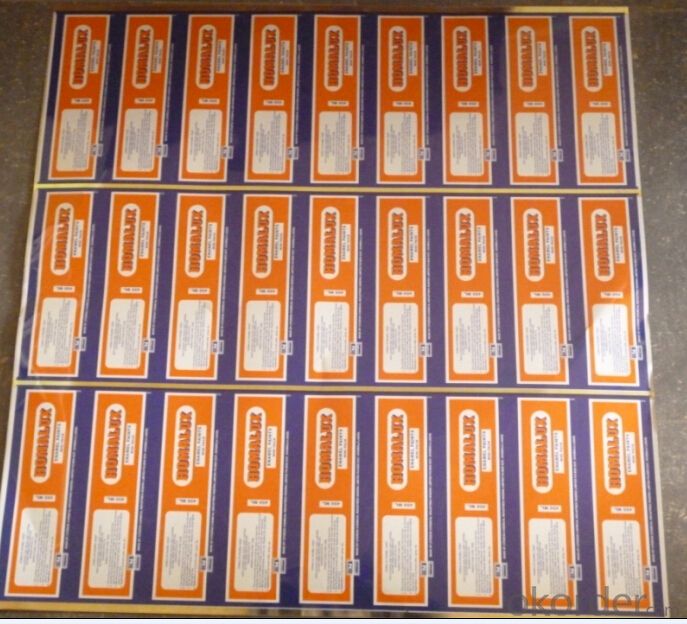
4. Specification
Standard : GB2520-2000 ,JIS G3303
Steel type : SPCC
Coating : 2.8/2.8
Surface: Bright, Stone ,
Thickness:0.31
Width :600MM~1000MM
Temper : T1~T5
Package: tinplate wrapped completely with an inner cover of plastic or waterproof papers with vorners protected with metal angels.
5.FAQ
A. What is the package of tinplate? (Referred as below)
For sheets, thin plastic film + rust-proof paper + metallic cover + metallic angles+ steel band strips + fumigated wooden pallet.
For coil, thin plastic film + rust proof paper + metallic cover + steel band strips + fumigated wooden pallet
B. The surface of tinplate could you supply?
Stone finish, Bright finish, Matte finish, Silver finish
- Q: What are the main factors affecting the price of tinplate?
- The main factors affecting the price of tinplate include the cost of raw materials such as tin and steel, changes in global supply and demand, fluctuations in currency exchange rates, trade policies and tariffs, as well as any political and economic stability issues in major tin-producing countries. Additionally, factors like technological advancements, environmental regulations, and changes in consumer preferences can also influence the price of tinplate.
- Q: How does tinplate contribute to the overall sustainability of packaging?
- Tinplate contributes to the overall sustainability of packaging in several ways. Firstly, tinplate is a highly durable and long-lasting material, which means that packaging made from tinplate can be reused and recycled multiple times without losing its quality. This helps reduce the need for producing new packaging materials, conserving resources and minimizing waste. Additionally, tinplate is 100% recyclable, meaning that it can be easily recovered and turned into new products, reducing the environmental impact associated with its disposal. Moreover, tinplate offers excellent protection and preservation properties, ensuring the longevity and safety of packaged goods, thus reducing food waste and promoting sustainable consumption. Overall, tinplate packaging plays a significant role in achieving a circular economy by minimizing waste generation, conserving resources, and promoting sustainable practices.
- Q: What are the benefits of using tinplate for pharmaceuticals?
- Tinplate offers several benefits for pharmaceutical packaging. Firstly, it provides excellent protection against light, moisture, and oxygen, ensuring the quality and stability of pharmaceutical products. Secondly, tinplate is a durable and robust material that offers resistance to corrosion, making it suitable for long-term storage. Additionally, tinplate is easily moldable, allowing for various shapes and sizes of packaging, including child-resistant closures. Lastly, tinplate is 100% recyclable, making it an environmentally friendly choice for pharmaceutical companies.
- Q: How does tinplate contribute to the protection of textile products?
- Tinplate contributes to the protection of textile products by providing a durable and corrosion-resistant packaging material. It acts as a barrier against moisture, oxygen, and other environmental factors that could damage the textiles. Additionally, tinplate containers can be sealed tightly, ensuring that the textile products remain intact and free from contamination during storage and transportation.
- Q: What are the different types of tinplate cans available?
- There are several different types of tinplate cans available, including round cans, rectangular cans, square cans, and specialty shaped cans such as oval or hexagonal. These cans come in various sizes to accommodate different products and can be found with different closures, such as pull-tab lids or screw-on caps. Additionally, tinplate cans can also be categorized based on their usage, such as food cans, beverage cans, or aerosol cans.
- Q: How does tinplate contribute to the overall ease of opening and closing packaging?
- Tinplate contributes to the overall ease of opening and closing packaging by providing a strong and durable material that can be easily shaped into various packaging forms. It offers excellent corrosion resistance, ensuring that the packaging remains intact and functional. Additionally, tinplate can be easily formed into easy-to-use closures, such as twist-off caps or pull tabs, enabling convenient opening and closing of the packaging without requiring any additional tools.
- Q: Can tinplate be used for packaging electronic components?
- Yes, tinplate can be used for packaging electronic components. Tinplate is a commonly used material in the packaging industry due to its excellent strength, durability, and corrosion resistance. It provides effective protection to electronic components and helps in preserving their quality during storage and transportation.
- Q: What are the health and safety concerns associated with tinplate?
- Some health and safety concerns associated with tinplate include potential exposure to tin, which can cause respiratory issues and skin irritation if inhaled or in contact with the skin for prolonged periods. Additionally, the coatings used on tinplate may contain harmful chemicals like bisphenol A (BPA), which has been linked to various health problems. It is important to handle and use tinplate products with caution, ensuring adequate ventilation and avoiding direct contact with the coating.
- Q: Can tinplate be used for agricultural applications?
- Yes, tinplate can be used for agricultural applications. It is commonly used for packaging agricultural products such as canned foods and beverages. Additionally, tinplate can be used for constructing storage containers, agricultural machinery components, and various farming equipment. Its corrosion resistance and durability make it suitable for these applications in the agricultural industry.
- Q: Can tinplate be used for automotive applications?
- Yes, tinplate can be used for automotive applications. Tinplate is a type of steel coated with a thin layer of tin, which provides excellent corrosion resistance. This makes it suitable for various automotive components such as fuel tanks, oil filters, and canisters. Tinplate's durability, strength, and ability to withstand extreme temperatures make it a reliable material for automotive applications.
Send your message to us
Prime Quality Tinplate Sheet for Making Cans
- Loading Port:
- Shanghai
- Payment Terms:
- TT or LC
- Min Order Qty:
- 25 m.t.
- Supply Capability:
- 1000 m.t./month
OKorder Service Pledge
OKorder Financial Service
Similar products
Hot products
Hot Searches
Related keywords
